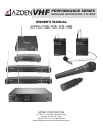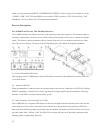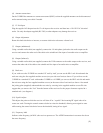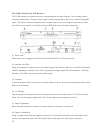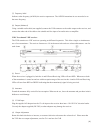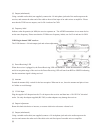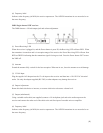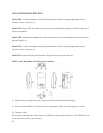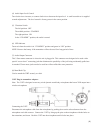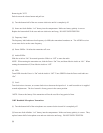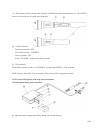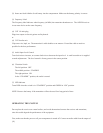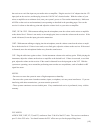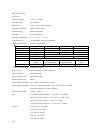(4) Antenna connections.
On the 311DRH the antennas are connector mounted (BNC) so that the supplied antennas can be disconnected
and/or remoted using coax cable if needed.
(5) 12-Volt Input.
Plug the supplied AC adaptor into the 12-volt input on the receiver and then into a 110-120 VAC electrical
outlet. Use only the adaptor supplied (BC-26U) as other adaptors may damage the receiver.
(6) Output Adjustment.
Rotate this knob clockwise to increase, or counter-clockwise to decrease volume level.
(7) Output (unbalanced).
Using a suitable audio cable (not supplied), connect the 1/4-inch phone jack end to the audio output on the
receiver and connect the other end of the cable to the suitable mic/line input of an audio mixer or amplifier.
(8) Output (balanced).
Using a suitable audio cable (not supplied) connect the XLR connector to the audio output on the receiver, and
connect the other end of the cable to the suitable mic/line input of an audio mixer or amplifier.
(9) Rack ears.
If you wish to use the 311DRH in a standard 19" rack by itself you can use the HR-1 rack kit and attach the
rack ears using the four supplied machine screws (two per side near front) as shown. If you wish to use the
311DRH in a standard 19" rack with another 311DRH or a 411DRH you can use the HR-2 rack kit and attach
the rack ears using the four supplied machine screws (on the outer sides of each unit) as shown. Also attach
the joining plate (supplied) underneath the two units by screwing in the supplied machine screws We also
suggest that you remove the “feet” from the bottom of the receivers for the proper clearance required in a
standard rack. (see diagram.)
(10) Squelch adjust.
This adjusts the point at which the receiver will shut off or “squelch” the incoming RF signal when it be-
comes too weak. Turning the control counter-clockwise raises the threshold, allowing more signal to enter
while turning the control clockwise lowers the threshold, letting in less signal.
(11) Frequency label
Indicates what frequency (in MHz ) the receiver operates on. The AZDEN transmitter in use must also be on
the same frequency.
(2)



